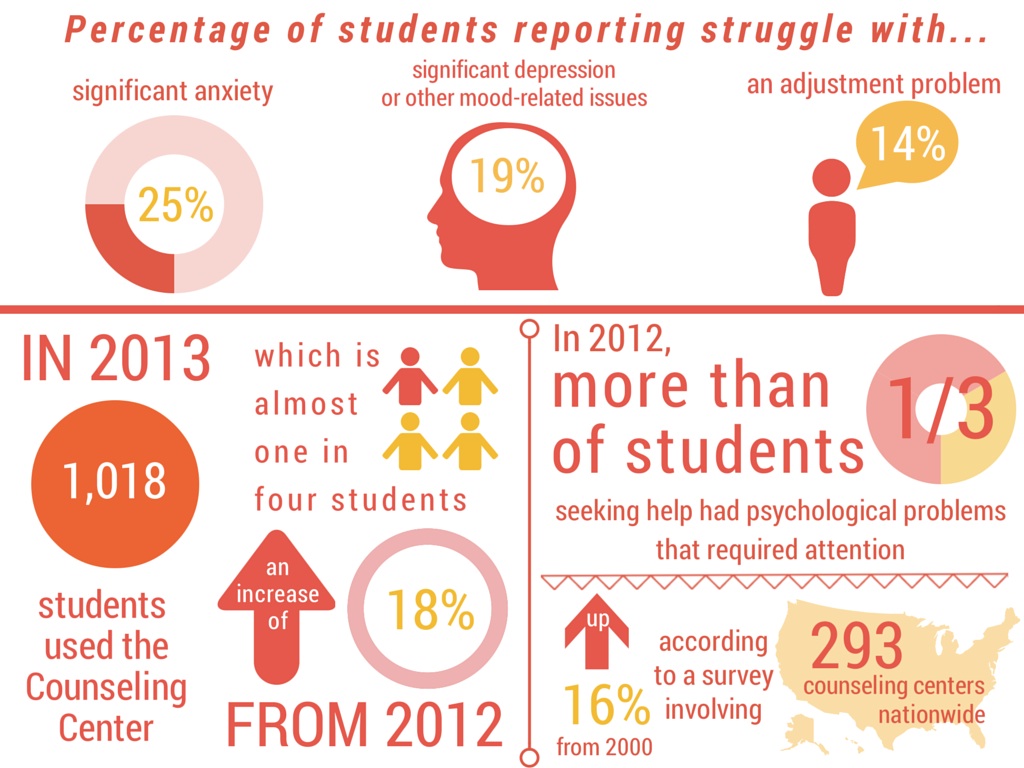Editor’s Note: The names of students mentioned in this story have been changed due to the sensitive nature of the content.
Kathy felt like she was giving up when she decided to take a semester off because her crippling depression “reared its ugly head” again. Today, the charismatic international relations major and member of the swing dance club wishes she had sought out professional help earlier.
Blake has been struggling with mental illness and maintaining sobriety since high school. After his stepfather intervened during Blake’s attempted suicide, Blake was involuntarily admitted into hospital supervision. Now, the finance major has deferred job offers from prominent investment banks like Goldman Sachs and has opted for a passion project that involves bringing local farming to Lehigh.
Brett has been struggling with anxiety since high school, an anxiety that culminated upon entering the social scene at Lehigh. The computer science and business major was reluctant to admit that he was going against the Lehigh mantra of “work hard, play hard” by going to counseling at the end of his first year. He said he wishes more people were willing to share their anxieties about meeting Lehigh’s academic and social expectations.
A 2013 Lehigh-run analysis revealed that 25 percent of students reported struggling with significant anxiety, 19 percent with significant depression or other mood-related issues and 14 percent with an adjustment problem.
Ian Birky, director of Lehigh’s counseling and psychological services, said that a total of 1,018 students used the Counseling Services Center in 2013, an increase of 18 percent from 2012.
That’s approximately one in four.
The American College Counseling Association found that more than one-third of students seeking help have psychological problems that require attention in 2012, up from 16 percent in 2000 in a survey involving 293 counseling centers nationwide.
With the increasing prevalence of mental health issues both on a national level and within Lehigh’s campus, why are more students not talking about it? With so many students struggling under the same incessant pressures of Lehigh, why aren’t there more open dialogues about these anxieties?
“It’s the invisible injury,” Kathy said. “Every time I walk down the street, people can’t see that I’m hurting, so it’s been very difficult for me, especially at Lehigh where everyone hits the ground sprinting and I’m not a sprinter.”
Lehigh students come to the Counseling Center largely for peak performance reasons in all domains of their life, Birky said. Whether it is due to academic or social reasons, he said that the inability to meet expectations in either of these areas might result in anxiety among students.
Lehigh is a competitive environment and anxiety can be a consequence of this persistent burden to succeed, said Aaron Sterba, a staff psychologist at the Lehigh Counseling and Psychological Services Center.
Sterba said that he would assume the apprehension surrounding the open discussion of mental health is related to the fear of judgment from others.
He said if students haven’t become comfortable with their own issues and with what they are struggling with, they are not going to talk about it in an open forum.
“I just wish that more people would stand up in class and say ‘I’m totally clueless,’ and be more open how they too are struggling,” Brett said. “I know that other people don’t struggle with an issue as complex as mine, but I would really appreciate if people were open about all of their anxieties.”
Birky said mental health is not an issue actively discussed on campus because of Lehigh’s elite school status, which results in an image-making culture. He said if you’re going to be in the top 50 schools, you’re going to feel a certain obligation to take on the responsibility of maintaining that top image.
Kathy said maintaining a certain image hampered her willingness to admit that she needed help from an outside source, to admit that she couldn’t do it on her own and to admit that she needed professional attention.
“I think a lot of people view mental health issues as signs of weakness,” Kathy said. “This is the time in our lives when we’re all supposed to be doing so well. It’s really tough when you’re not performing as well as the person next to you who is doing a billion extracurriculars and is ridiculously social on top of all their academics.”
Judith Lasker, a professor of sociology with a research focus on global health, said that mental illness is stigmatized in every society and is rarely on the forefront of mainstream discussion.
She said eliminating this stigma on a national level is political — it’s a matter of advocacy and marketing.
Given the example of breast cancer and its pink ribbon campaign, Lasker said that for any cause to come out of the shadows, those facing the illness must be open and public about their experiences and solicit support from friends and family members.
Kathy said that mental illness is too often associated with something being wrong with you and announcing is seen as a detriment to yourself.
“There’s a stigma involved with mental health and I was definitely reluctant — it’s not really something that people talk about,” said Ryan, a student who has been visiting the Lehigh Counseling Center for more than two years.
Ryan said that it wasn’t until he attended group therapy sessions at the Counseling Center that he learned how to talk about mental health and that he wasn’t the only one unwilling to be vulnerable and ask for help.
Group therapy sessions are confidential discussions led by a certified psychologist with a group of seven to 10 students that represent every demographic on campus, Birky said.
He said the desired end result of these group sessions is for these students that represent all walks of Lehigh life to openly talk about their vulnerabilities. This could then translate to an unfettered discussion with their close friends outside of therapy.
Ryan said that one of the reasons students who attend the Counseling Center are apprehensive to open up outside of the group therapy sessions is because most people just don’t know the details bout specific conditions.
“I wish more people knew how to communicate,” Ryan said. “If I was to tell you that I had a mental illness, a lot of people would not know how to approach it. I want students to know how to relate.”
Brett said that he wishes that everyone knew mental health was an issue that existed on some level. He also said it’s important for students to know that the Counseling Center is a resource for everyone, not only for those struggling with more serious mental health issues.
According to the Lehigh Counseling and Psychological Services website, aside from group and individual therapy sessions, the Counseling Center is also engaging in outreach training and meetings with members of Greek life organizations, graduate student council, student athlete mentors and peer health advisers, as well as with students in the International Student Center and Women’s Center.
Blake said the Counseling Center provides an accessible platform to go to talk with someone who has an earnest and honest intention of listening, but the dialogue surrounding mental health cannot stay behind the Counseling Center walls.
“We don’t talk because we have this belief that we’re alone,” Blake said. “Just because you’re struggling in this moment does not mean you are flawed or broken irreversibly. In a certain way, students need to sort of get over themselves and if they did, I think that this whole dialogue surrounding mental health would be a lot easier.”






Comment policy
Comments posted to The Brown and White website are reviewed by a moderator before being approved. Incendiary speech or harassing language, including comments targeted at individuals, may be deemed unacceptable and not published. Spam and other soliciting will also be declined.
The Brown and White also reserves the right to not publish entirely anonymous comments.
1 Comment
wonderful article to make more people aware